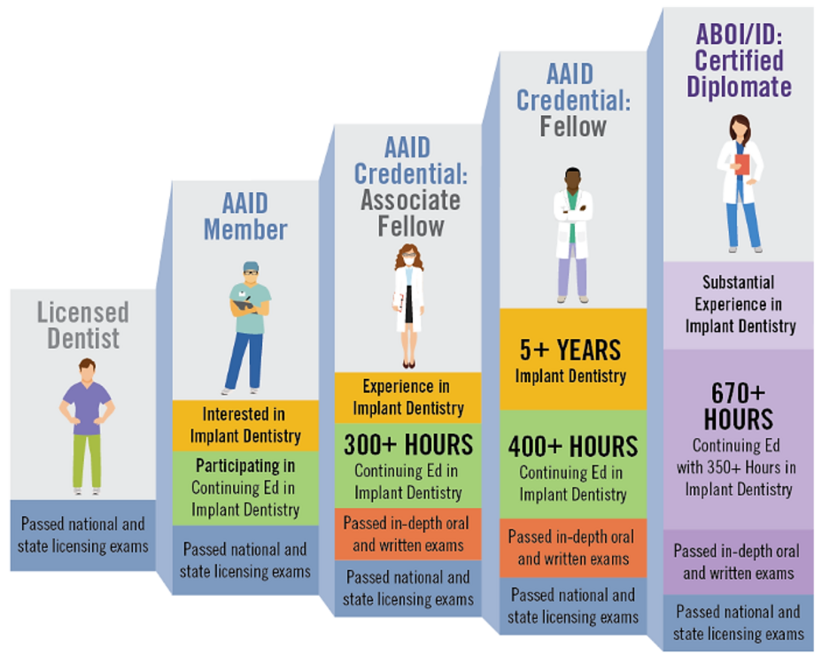
There is a SIGNIFICANT difference in ability between “general dentists that say they do implants” and an AAID-Credentialed Dental Implant Expert
Beware Of Dental Implant Placement By General Dentists Who Lack Dental Implant Specialty Training
Dr. Bramanti has achieved the highest level of training and experience being a Board-Certified Diplomate of the American Board of Oral Implantology/Implant Dentistry (ABOI/ID).
For the first 30 years of implant dentistry in this country, dental implants placed by Dental Implant Surgical Specialists enjoyed a reputation of excellence, predictability, and sustainability. Recently, this trend of success has been endangered by dental implant placement performed by inexperienced general dentists (non-specialists) who have not received formal surgical training in an American Dental Association (ADA) accredited 3-6 year residency program.
Dental Implants Placed By General Dentists Result in 7 Times Greater Implant Failure Compared to Dental Implant Expert Specialists
Dental implant failure and jaw deformities are two common complications of improper implantation. In fact a recent 2014 article in the Journal of the American Dental Association (JADA) a study of dental implant placement by general dentists concluded that dental implants placed in general dental practices resulted in 7 times greater implant failure rates (20% implant loss) than those reported in studies conducted in Dental Implant Specialty settings (only 2-3% implant loss). This definitive study examining dental implant placement by general dentists indicates patients should reasonably expect 1-in-5 dental implants will fail.
No one individual can master all the steps and all the complexities of the dental implant process. Find out for yourself who is most qualified to provide the excellence you deserve when considering dental implants.
Three to six years of specialized surgical training is required to effectively perform oral surgery and dental implant placement into bone. It is imperative to realize that the dental profession allows untrained general dentists to perform a broad range of surgical procedures without any formal training whatsoever.

Dental implant weekend classes, webinars, minicourses or bootcamp events are not the kind of training you should feel comfortable with from any practitioner placing metal medical devices into your jawbones. Be assured of your practitioner’s level of ADA-accredited surgical training, years of experience, and track record of success. This is the first benchmark in assuring that your Dental Implant Specialist is knowledgeable and capable of offering you a high standard of care.
The goal of Affordable Dental Implant Excellence is to inform the community of the Central Valley about what is necessary for proper surgical placement of a dental implant into the bones of the skull. An informed public will be better able to make dependable health decisions and thereby avoid injury and jaw deformity.
Don’t Be Misled Into A Quick & Easy Path With Immediate Implant Placement
Driven by a climate of economic decline, general dentists have tried to hasten implant placement by skipping essential treatment steps and using cheaper quality dental implants and bone graft materials. General dentists are not trained in bone grafting during dental school. In an effort to circumvent bone grafting, many general dentists have attempted to insert a dental implant into the bone socket at the time of tooth removal. This process is called immediate implant placement or “implants in a day.” Initially, it was believed that implant placement at the time of tooth removal would prevent bony socket collapse. However, recent clinical research has conclusively proven that placing a dental implant into a fresh tooth socket cannot prevent collapse of the bony ridge.
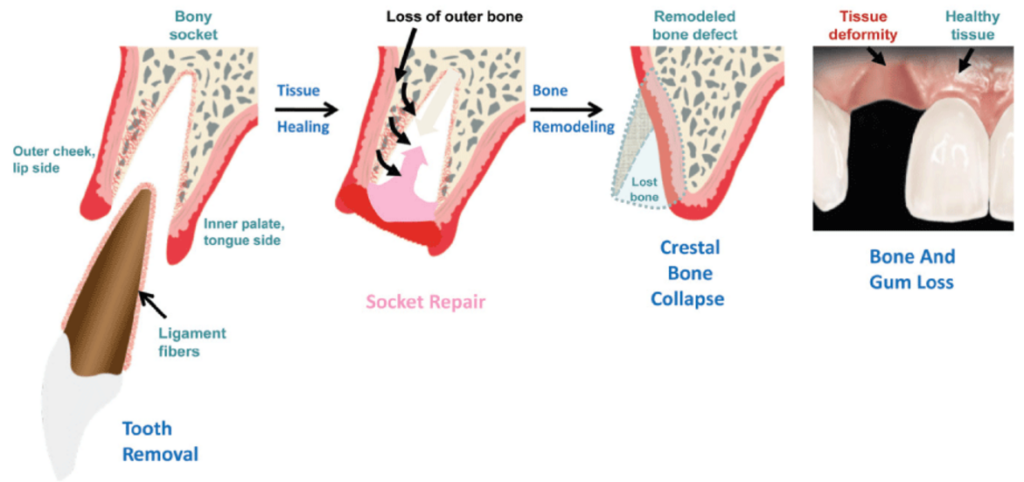
The bone does not “see” the implant and therefore bone remodeling is not influenced by the implant device. Bundle bone was lost following implant installation due to the genetically programmed collapse. A dental implant is unable to substitute for a tooth immediately following removal and cannot meet the biologic demands or provide the essential blood supply required to retain the delicate bundle bone.

It is now well established that dental implant placement immediately into fresh tooth sockets results in loss of the outer bone covering the dental implant and the metal implant surface becomes exposed. This bundle bone collapse results in gum recession, esthetic concerns and ultimately implant failure (see below).
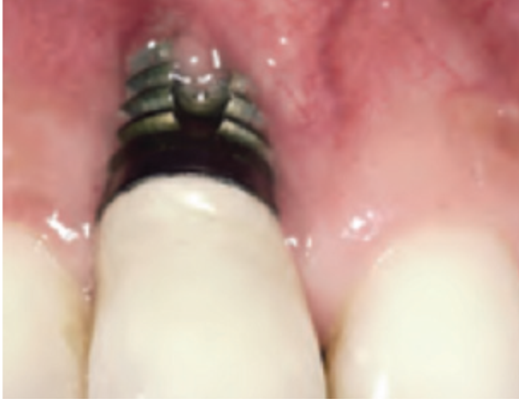
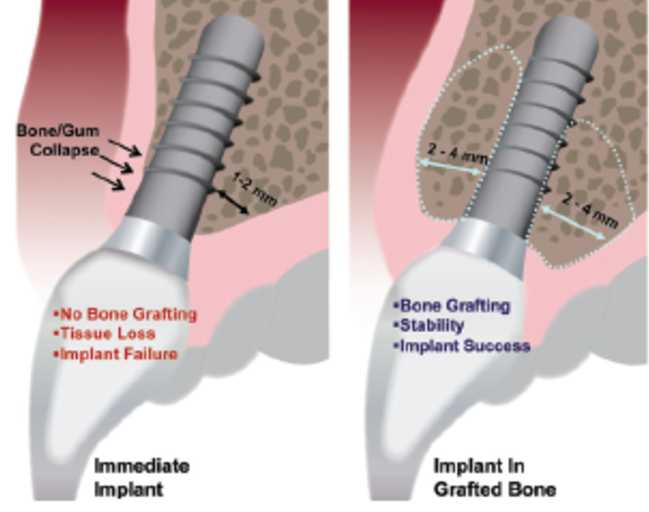
“Dental Implants In A Day” also known as “Same Day Dental Implants,” almost always require extraction of teeth with immediate dental implant placement into the tooth socket. This approach to dental implant placement is the most demanding clinical procedure in dental implant placement, requiring extensive clinical knowledge, exceptional bone grafting skills, long-standing clinical surgical experience and careful case selection. A well-trained Board-Certified Specialist who is a credentialed Dental Implant Expert is the most capable provider to guide you through this complex treatment process.
Be cautious of General Dentists who proclaim “they do implants” but lack the years of specialized dental implant surgical training and credentials. Most General Dentists apply a “One Treatment Fits All Approach” to “Dental Implants In A Day,” because they lack the treatment range, clinical skillsets, credentialed knowledge and experience to provide multiple treatment options that best fit your needs. This approach results in significant jawbone reduction causing a permanent jaw deformity (which cannot be reversed), to accommodate enough space for the bulky denture appliances. In addition, because General Dentists lack the bone grafting skills found in a Board-Certified Dental Implant Expert Specialist, they can only place angled dental implants where bone exists in an effort to support an imposing denture appliance which traps food and can be difficult to keep clean.
Before deciding to have a General Dentist apply the “One Treatment Fits All Approach” make sure you seek an opinion from a Board-Certified Dental Implant Expert Specialist. If the General Dentist has not offered you the option to a seek an opinion from a highly skilled and experienced Dental Implant Expert Specialist, you should be cautious and seek out on your own all available avenues that meet the standard of care.
Seeking a consultation with a Board-Certified Dental Implant Expert Specialist is beneficial — Dr. Bramanti will have more experience in diagnosing and treating tooth replacement options like yours. Consulting a Board-Certified Dental Implant Expert Specialist in the area of your concern can certainly be advantageous to receiving the best possible care available to you. Dr. Bramanti will offer you expertise in your diagnosis, and can also offer insight into additional treatment possibilities that the first doctor may not have mentioned or is incapable of offering. As a result, you become more informed about what is available to you and can make an informed decision about your healthcare and your treatment plan.
Dr. Bramanti can provide you with treatment possibilities that permit you to have dental implant teeth for the rest of your life, instead of bulky denture appliances that wear out over time and have to be replaced. Afterward, you will know that you have done everything you can to ensure that you have the correct diagnosis and a treatment plan that feels right to you.
Immediate Implant Placement Requires Exceptional Skill and AdvancedSpecialty Training
Immediate implant placement is the most demanding clinical approach in dental implant placement, requiring exceptional bone grafting skills, long-standing clinical surgical experience and careful case selection. Immediate dental implant placement has been cautiously utilized by the leading Dental Implant Specialists in the field of implant dentistry. Several studies have reported unsightly results due to bundle bone collapse and gum recession as soon as 6 months after implant placement.
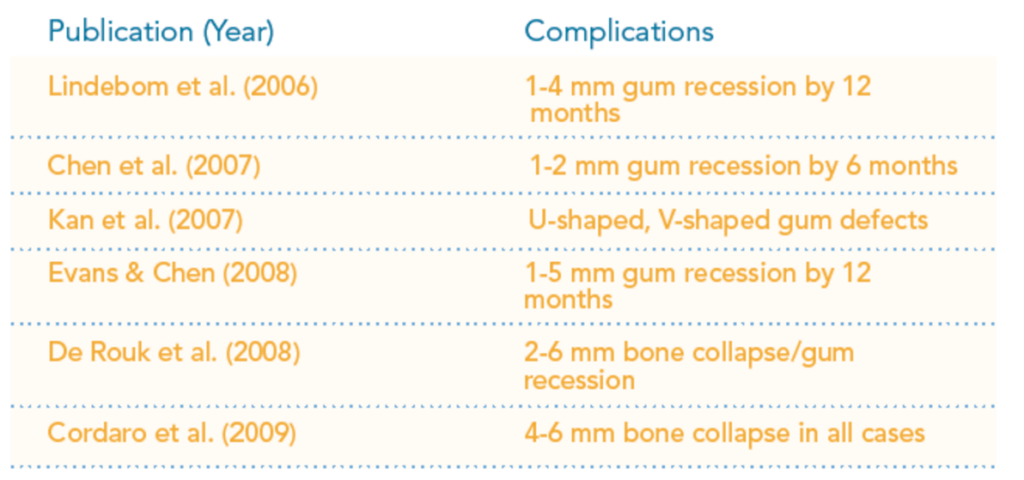
This immediate approach to dental implant placement is no longer considered an appropriate first line standard of care because of the high incidence of unsatisfactory results and complications that lead to jaw deformity including additional tooth loss. Do not be talked into a quick fix with dental implants which could lead to poor results and deformational harm. If a tooth is to be extracted, it is critical that bone grafting be performed to prepare the site by increasing the bone volume prior to replacement with a dental implant. Efforts to skip the bone building process by immediate insertion of the dental implant will lead to bone collapse, esthetic nightmares, chronic tissue infection, and eventually dental implant failure. Proper case selection is essential for lasting results.
For successful dental implantation, it is important to take the time required to complete the necessary steps to achieve a result that lasts a lifetime.
“Dental Implants In A Day” also known as “Same Day Dental Implants,” almost always require extraction of teeth with immediate dental implant placement into the tooth socket. This approach to dental implant placement is the most demanding clinical procedure in dental implant placement, requiring extensive clinical knowledge, exceptional bone grafting skills, long-standing clinical surgical experience and careful case selection. A well-trained Board-Certified Specialist who is a credentialed Dental Implant Expert is the most capable provider to guide you through this complex treatment process.
Be cautious of General Dentists who proclaim “they do implants” but lack the years of specialized dental implant surgical training and credentials. Most General Dentists apply a “One Treatment Fits All Approach” to “Dental Implants In A Day,” because they lack the treatment range, clinical skillsets, credentialed knowledge and experience to provide multiple treatment options that best fit your needs. This approach results in significant jawbone reduction causing a permanent jaw deformity (which cannot be reversed), to accommodate enough space for the bulky denture appliances. In addition, because General Dentists lack the bone grafting skills found in a Board-Certified Dental Implant Expert Specialist, they can only place angled dental implants where bone exists in an effort to support an imposing denture appliance which traps food and can be difficult to keep clean.
Before deciding to have a General Dentist apply the “One Treatment Fits All Approach” make sure you seek an opinion from a Board-Certified Dental Implant Expert Specialist. If the General Dentist has not offered you the option to a seek an opinion from a highly skilled and experienced Dental Implant Expert Specialist, you should be cautious and seek out on your own all available avenues that meet the standard of care.
Seeking a consultation with a Board-Certified Dental Implant Expert Specialist is beneficial — Dr. Bramanti will have more experience in diagnosing and treating tooth replacement options like yours. Consulting a Board-Certified Dental Implant Expert Specialist in the area of your concern can certainly be advantageous to receiving the best possible care available to you. Dr. Bramanti will offer you expertise in your diagnosis, and can also offer insight into additional treatment possibilities that the first doctor may not have mentioned or is incapable of offering. As a result, you become more informed about what is available to you and can make an informed decision about your healthcare and your treatment plan.
Dr. Bramanti can provide you with treatment possibilities that permit you to have dental implant teeth for the rest of your life, instead of bulky denture appliances that wear out over time and have to be replaced. Afterward, you will know that you have done everything you can to ensure that you have the correct diagnosis and a treatment plan that feels right to you.
There is a SIGNIFICANT difference in ability between “general dentists that say they do implants” and an AAID-Credentialed Dental Implant Expert
Beware Of Dental Implant Placement By General Dentists Who Lack Dental Implant Specialty Training
Dr. Bramanti has achieved the highest level of training and experience being a Board-Certified Diplomate of the American Board of Oral Implantology/Implant Dentistry (ABOI/ID).

For the first 30 years of implant dentistry in this country, dental implants placed by Dental Implant Surgical Specialists enjoyed a reputation of excellence, predictability, and sustainability. Recently, this trend of success has been endangered by dental implant placement performed by inexperienced general dentists (non-specialists) who have not received formal surgical training in an American Dental Association (ADA) accredited 3-6 year residency program.
Dental Implants Placed By General Dentists Result in 7 Times Greater Implant Failure Compared to Dental Implant Expert Specialists
Dental implant failure and jaw deformities are two common complications of improper implantation. In fact a recent 2014 article in the Journal of the American Dental Association (JADA) a study of dental implant placement by general dentists concluded that dental implants placed in general dental practices resulted in 7 times greater implant failure rates (20% implant loss) than those reported in studies conducted in Dental Implant Specialty settings (only 2-3% implant loss). This definitive study examining dental implant placement by general dentists indicates patients should reasonably expect 1-in-5 dental implants will fail.
No one individual can master all the steps and all the complexities of the dental implant process. Find out for yourself who is most qualified to provide the excellence you deserve when considering dental implants.
Three to six years of specialized surgical training is required to effectively perform oral surgery and dental implant placement into bone. It is imperative to realize that the dental profession allows untrained general dentists to perform a broad range of surgical procedures without any formal training whatsoever. Dental implant weekend classes, webinars, minicourses or bootcamp events are not the kind of training you should feel comfortable with from any practitioner placing metal medical devices into your jawbones. Be assured of your practitioner’s level of ADA-accredited surgical training, years of experience, and track record of success. This is the first benchmark in assuring that your Dental Implant Specialist is knowledgeable and capable of offering you a high standard of care.
The goal of Affordable Dental Implant Excellence is to inform the community of the Central Valley about what is necessary for proper surgical placement of a dental implant into the bones of the skull. An informed public will be better able to make dependable health decisions and thereby avoid injury and jaw deformity.
Don’t Be Misled Into A Quick & Easy Path With Immediate Implant Placement
Driven by a climate of economic decline, general dentists have tried to hasten implant placement by skipping essential treatment steps and using cheaper quality dental implants and bone graft materials. General dentists are not trained in bone grafting during dental school. In an effort to circumvent bone grafting, many general dentists have attempted to insert a dental implant into the bone socket at the time of tooth removal. This process is called immediate implant placement or “implants in a day.” Initially, it was believed that implant placement at the time of tooth removal would prevent bony socket collapse. However, recent clinical research has conclusively proven that placing a dental implant into a fresh tooth socket cannot prevent collapse of the bony ridge.

The bone does not “see” the implant and therefore bone remodeling is not influenced by the implant device. Bundle bone was lost following implant installation due to the genetically programmed collapse. A dental implant is unable to substitute for a tooth immediately following removal and cannot meet the biologic demands or provide the essential blood supply required to retain the delicate bundle bone.

It is now well established that dental implant placement immediately into fresh tooth sockets results in loss of the outer bone covering the dental implant and the metal implant surface becomes exposed. This bundle bone collapse results in gum recession, esthetic concerns and ultimately implant failure (see below).
Immediate implant leads to
bone and gum loss over time

Bone surrounding an immediate implant
collapses resulting in failure

Immediate Implant Placement Requires Exceptional Skill and AdvancedSpecialty Training
Immediate implant placement is the most demanding clinical approach in dental implant placement, requiring exceptional bone grafting skills, long-standing clinical surgical experience and careful case selection. Immediate dental implant placement has been cautiously utilized by the leading Dental Implant Specialists in the field of implant dentistry. Several studies have reported unsightly results due to bundle bone collapse and gum recession as soon as 6 months after implant placement (see Table below).

This immediate approach to dental implant placement is no longer considered an appropriate first line standard of care because of the high incidence of unsatisfactory results and complications that lead to jaw deformity including additional tooth loss. Do not be talked into a quick fix with dental implants which could lead to poor results and deformational harm. If a tooth is to be extracted, it is critical that bone grafting be performed to prepare the site by increasing the bone volume prior to replacement with a dental implant. Efforts to skip the bone building process by immediate insertion of the dental implant will lead to bone collapse, esthetic nightmares, chronic tissue infection, and eventually dental implant failure. Proper case selection is essential for lasting results.
For successful dental implantation, it is important to take the time required to complete the necessary steps to achieve a result that lasts a lifetime.
